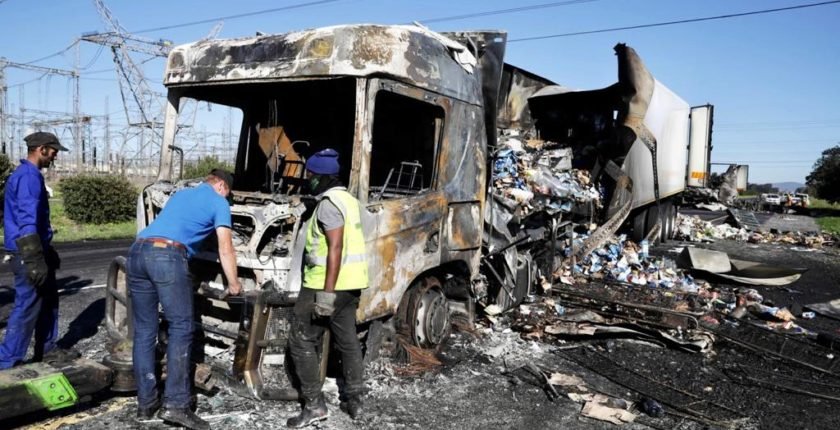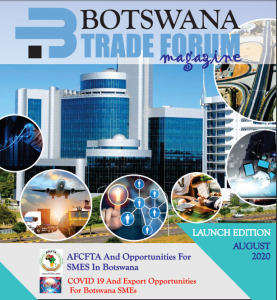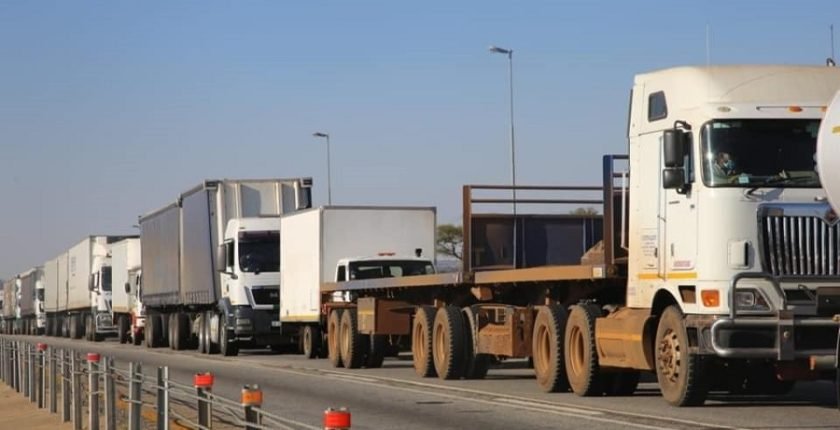Introduction
The broad objective of the Africa Continent Free Trade Area (AfCFTA) is to create a single continental market for goods and services, with free movement of business persons and investments, paving the way for accelerating the establishment of the Continental Customs Union. The success of AFCFTA will among other issues depend on the smooth movement of goods in transit from seaports to their destination countries. A number of countries that include Zimbabwe, Zambia, Democratic Republic of Congo (DRC) and Malawi use South African ports such as Durban to import and export their goods outside Africa. Therefore, recurrent truck driver strikes which put the safety and security of both foreign drivers and property (trucks and consignments) in danger are a cause for concern for the successful implementation of AFCTA in general and promotion of intra-SADC trade in particular.
This paper seeks to find answers to the followings questions: What are the drivers’ grievances? Are these grievances genuine? Who are leading these strikes? How much damage have been caused by these recurrent strikes? It further recommends what the South African stakeholders including the government can do to find a lasting solution to the challenge.
South African truck drivers’ strike has been happening annually since 2018. According to Road Freight Association (RFA) Chief Executive Gavin Kelly, there has been unrest with the trucking industry for the last 18 months.[1] SABC News reported that over 1 000 truck drivers abandoned their trucks across the country on Tuesday (7 July 2020), to protest against the employment of foreign drivers.[2] The striking drivers also complained of poor working conditions and alleged that their fight for better working conditions were frustrated by foreigners who replaced them when they resign in protest. They claimed that foreigners were prepared to work for less favourable conditions due to desperation.[3] Who is leading the strikes?
Who are the leaders of these strikes?
Sipho Zungu, leader of the All Truck Drivers Foundation (ATDF), told TimesLIVE on Monday (6 July 2020) he was aware of calls for a national shutdown, but he had “nothing to do with it”.[4] However, his colleagues in ATDF gave an indication that they were behind the protests. ATDF spokesperson Michael Masimini, in an interview with eNCA, said the national protest is for truck drivers and for those South African citizens who are unemployed. Masimini said employers who have foreign truck drivers in their companies are in contravention of the Employment Services Act. “This is not only the ATDF strike, this is national. We are engaging ourselves in this peaceful strike as we are trying to draw attention to our government that we as South African citizens and unemployed ones, we do have employment. All that we are saying is we need them to tell us a date or a day to say they are taking off all the foreign national drivers on the truck so that our people can actually begin to work,” said Masimini.[5]
Another leader of the same group was reported to have said that “today we are calling for every South African truck driver to make sure that his truck does not operate. These were the words of All Truck Drivers Foundation Secretary, Mandla Mngomezulu, who told City Press that the strike carried out by truck drivers on Tuesday morning was to “ensure that South African companies stop hiring foreign nationals”.[6]
SA National Cargo Transport Association deputy treasurer Jabulani Manana, who had also braved the morning cold and was at the City Deep Truck Stop, said his organisation was “standing in solidarity with South African truck drivers who for some reason are not privileged enough to be hired by their own people”.[7]
However, some industry associations have disassociated themselves from these strikes. SA Transport and Allied Workers Union (Satawu) deputy general secretary Anele Kiet reportedly distanced the union from any sort of shutdown.[8] “It has been our stance before and it is still our stance – all issues pertaining to workers in that industry have a platform to negotiate through the bargaining council,” Satawu general
How many foreigners are employed?
There is no agreement between employers and employees on how many foreigners are employed in the industry. ALL Truck DRIVERS Foundation (ATDF) secretary, Mandla Mngomezulu was quoted as having said that he travelled a lot in the Southern African Development Community (SADC) countries and 90% of the truck drivers he met on the road were foreign nationals employed by local trucking companies.”[9] However, the Road Freight Association (RFA) dismissed claims that the majority of truck drivers employed in South Africa were foreigners. Gavin Kelly said that, “90 percent of employees are not foreigners. The percentage is somewhere around 10 percent of drivers who are foreign nationals. The legally employed foreigners are protected and governed by the labour laws of the country. So if I have a foreigner from wherever, who has a work permit, has the correct driving license and requirements, then I have to pay that driver the minimum requirements of the bargaining council agreement.”[10]
There is need to establish the correct industry position through government company audits.
What are the working conditions of truck drivers?
Ngarachu et al (2018) established the following about truck drivers’ working conditions in SADC region in general:
“Truckers face poor working conditions in general, which undermine driver well-being and contribute to slow movement along the corridor. Truck drivers reported a litany of workplace challenges, which are both a serious labour rights concern and have the potential to slow movement at borders. They complained about a lack of downtime between trips and so preferred to spend more time at the border to rest, even once clearance is completed. They did not have enough funds for necessities, as many were not given adequate stipends by their employers, and as a result of this they were more likely to act as conduits for smuggling by mainly cross-border traders. Other complaints included poor treatment by certain officials; the lack of amenities at border posts; downsizing of support teams such as escorts and co-drivers; concerns over harassment in the Democratic Republic of Congo and xenophobia in South Africa; and reports of union-busting during attempts to organise. It is thus doubtful whether drivers have any incentive to reduce standing time.”[11]
Truck drivers in other countries agree to work under these conditions out of desperation. South African drivers need these conditions to be changed but see foreign drivers as a stumbling block in their fight for better working conditions. Ngarachu et al (2018) recommended formation of a regional body that looks into the welfare of cross border truck drivers.
Employers on the other had claim to be paying truck drivers as provided by the law. Gavin Kelly was reported to have said that he pays drivers the minimum requirements of the bargaining council agreement.”[12]
How much damage have these strikes caused?
Two trucks, reportedly carrying goods for supermarkets, were set alight on the N1 highway near Cape Town during protests against the employment of foreigners as truck drivers[13]
In 2019, more than 70 trucks were torched in KwaZulu-Natal, as truck drivers took their anger to the streets causing property damage estimated at over R1-billion. [14]
South Africa’s Road Freight Association (RFA), estimates that at least 213 lives have been lost and 1 200 vehicles and cargoes destroyed since March 2018, when the war on trucks began. The association puts the cost to the economy at about R1, 2 billion.[15]
What might be the effect of the strikes on SADC intra-regional trade?
It is worth noting that around 50% of trucks moving the goods across the SADC borders are from South Africa. If other countries were to retaliate by banning South African trucks in their territories and shunning South African ports, the economic loss would far outweigh the cost of employing foreign truck drivers. Already available evidence shows that traders were shifting from the use of Durban port to Beira port in Mozambique. Recurrent truck driver strikes which are xenophobic in nature will worsen the situation.
Annual truck driver strikes increase the cost of doing business in SADC as trucks are forced to park during strikes thereby increasing demurrage charges. This will definitely motivate traders to shun South African ports.
The repercussions on the South African economy might not be immediate but as freight forwarders and traders in general decide to use alternative routes to save lives, the current striking drivers may work up to realise that they are feeling comfortable in a world that no longer exist.
What is the South African Government doing about it?
The president of International Cross Border Transport Association Denis Juru alleged that no arrest and prosecutions were done in the past.
In the latest protest, the Gauteng High Court in Pretoria granted an interdict against the planned strike, restraining the All Truck Drivers Foundation (ATDF) and its secretary general Sifiso Nyathi from organising, encouraging or inciting any protest action or “national shutdown”.[16] The police reacted swiftly to mitigate the damage.
There is also a provision for a bargaining council for negotiations of this nature to take place. [17] There are also media reports indicating that the government has been trying to engage the stakeholders. However, striking truck drivers have alleged that their engagement with government is like empty talk shows with nothing binding and concrete coming out of these meetings.
What is not clear is whether or not the government has a concrete action plan to deal with recurrent truck driver strikes.
What is the government expected to do?
Traders who use South African ports expect the government to ensure that the trucks carrying their goods will be secure and the safety of their drivers is guaranteed.In 2019, the president of International Cross Border Transport Association Denis Juru, said:
“We warn the South African government to protect foreign nationals in their country. We have previously witnessed foreign nationals getting killed, assaulted and threatened without a single person being arrested or prosecuted. South Africa is not an island in heaven. The government should respect rights of foreign nationals,”[18]
The same sentiments were echoed by southern Africa director at Human Rights Watch who said that:
“South African authorities should urgently intervene to stop the unlawful, unprovoked, and violent attacks and harassment of foreign truck drivers and bring the perpetrators to justice,” said Dewa Mavhinga, southern Africa director at Human Rights Watch. “Any problems in the trucking industry, including undocumented drivers, are for the relevant authorities to address, and there is no defense to groups committing such violent, horrific crimes.”[19]
In the absence of verified official data on how many foreigners are employed as drivers in South Africa, we are tempted to give the striking drivers a benefit of doubt. In our view, there is an urgent need to create a national committee comprising all stakeholders including leaders of these strikes, other workers unions, employers’ representatives, human rights campaigners and government to investigate and agree on the following:
1. How many foreign nationals are employed in the industry?
2. What are the working conditions of truck drivers and assess employer compliance of the regulations.
3. What should be done to address the drivers concerns taking South Africa`s obligations under SADC and AFCFTA into consideration; for example, South Africa’s obligation under GATS is to have a schedule of commitment on the movement of natural persons on a particular industry, Transport in this case?
4. Agree on the implementation matrix of the agreed action plans.
We further recommend that the government and the private sector come up with deliberate programs to raise awareness on regional integration among the ordinary citizens. These programs may include peer educators at workplaces, roadshows and electronic media programs.
Conclusion
It is important for South Africa to realise that it is in a global community where cooperation and interaction is essential for trade. Thus it needs other countries as much as they need it. However, there are other alternative routes should traders from other countries feel there is lack of security in using the South African route.
Recurrent truck driver strikes will force traders to shun South African ports and use other ports such as Beira. If measures are not taken to guarantee the safety and security of both foreign truck drivers and property in South Africa, traders may resolve to use other ports such as Beira in Mozambique or Walvis Bay in Namibia. With the recent upgrade of the Forbes-Harare-Plumtree highway, traders can use the Beira Port and use the Zimbabwe route which is safer.
The success of AfCFTA depends on peace and stability in the freight forwarding industry. Stakeholders in South Africa should find each other and resolve to end the recurring truck driver strikes.
About the author:

Elisha Tshuma is a Customs and Trade Facilitation Expert based in Zimbabwe. He holds a Master of Commerce Degree in Management in Trade Law and Policy from the University of Cape Town and has worked extensively in the area of customs, tax and border administration in Southern Africa. Elisha is a visiting lecturer at the National University of Science and Technology (NUST) in Zimbabwe, where he teaches Customs Management and Reforms. He currently serves as Director: Customs and Trade Facilitation at Shalom Fiscal Consultants in Harare, Zimbabwe. He can be contacted on tshumaelisha72@gmail.com or +263 777850251 or www.shalomfiscal.co.zw.
He writes in his personal capacity.
[1] http://www.capetalk.co.za/articles/359616/listen-who-is-behind-the-current-truck-strike-disrupting-sa-roads
[2]https://www.sabcnews.com/sabcnews/foreign-truck-drivers-feel-targeted-as-strike-persists/
[3]https://www.news24.com/citypress/news/truck-companies-need-to-employ-south-africans-say-protesting-drivers-20200707
[4]https://www.news24.com/news24/southafrica/news/interdict-granted-against-truck-driver-strike-over-employment-of-foreign-nationals-20200707
[5] https://www.thesouthafrican.com/news/truck-drivers-protest-national-strike-video/
[6] https://www.news24.com/citypress/news/truck-companies-need-to-employ-south-africans-say-protesting-drivers-20200707
[7]https://www.news24.com/citypress/news/truck-companies-need-to-employ-south-africans-say-protesting-drivers-20200707
[8] https://www.news24.com/news24/southafrica/news/interdict-granted-against-truck-driver-strike-over-employment-of-foreign-nationals-20200707
[9] https://www.news24.com/citypress/news/truck-companies-need-to-employ-south-africans-say-protesting-drivers-20200707
[10] https://www.sabcnews.com/sabcnews/foreign-truck-drivers-feel-targeted-as-strike-persists/
[11] https://www.google.com/search?q=Border+economies+report+by+GEG&oq=Border+economies+report+by+GEG&aqs=chrome..69i57.30005j0j7&sourceid=chrome&ie=UTF-8
[12] https://www.sabcnews.com/sabcnews/foreign-truck-drivers-feel-targeted-as-strike-persists/
[13] https://lh3.googleusercontent.com/9Rf-tvkWCG7s8CT4VT2-tJ_3CTSHMG-3SA3nMi64-6NmbSNWMbffSU2Od5OhkwZlBTKUGMVmDrwMmBkUOjuf=s1200
[14] https://www.enca.com/news/govt-calls-truck-drivers-strike-be-monitored
[15] https://focusontransport.co.za/truckers-road-to-hell/
[16]https://www.news24.com/news24/southafrica/news/interdict-granted-against-truck-driver-strike-over-employment-of-foreign-nationals-20200707
[17] https://www.thesouthafrican.com/news/truck-drivers-protest-national-strike-video/
[18] https://www.iol.co.za/news/south-africa/government-warned-to-protect-foreign-bus-truck-drivers-as-strike-looms-31550902
[19] https://www.hrw.org/news/2019/08/26/south-africa-deadly-attacks-foreign-truck-drivers





